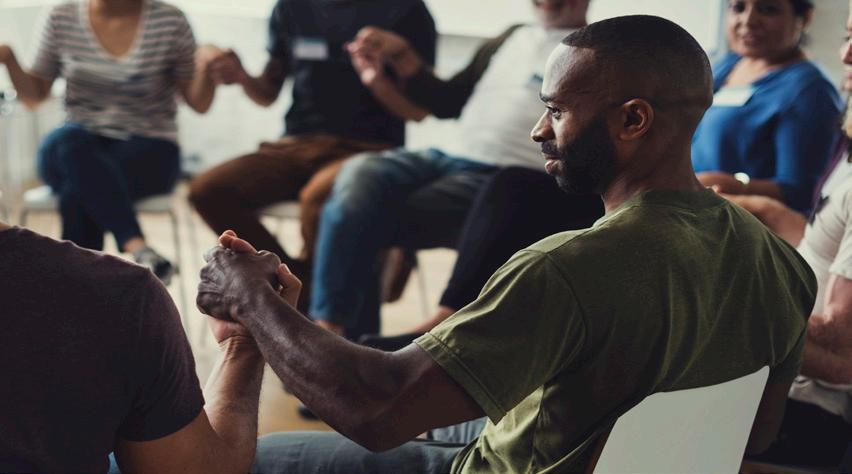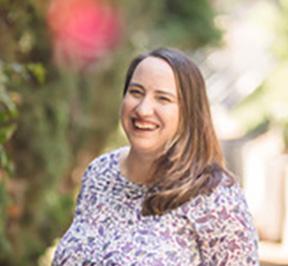
5 minute read
Real Talk: Timeless Hope
By Leslie McCaddon, Steven A. Cohen Military Family Clinic at VVSD
www.vvsd.net/cohenclinicsandiego

Timeless Hope
As a child I was surrounded by Veterans and their spouses and hardly noticed.
My mother spoke of her childhood as a “Navy brat” with a sour bitterness rivaled only by her intense aversion to anything lemon flavored. The Navy, she often told us, was that awful thing that always took her beloved Daddy away from her for months at a time.

In my earliest memories, the military in my family was more history and lore than it was a practical reality. In addition to my mom’s retired Master Chief father, I was vaguely aware that my Dad’s stepfather and biological father were WWII Army veterans. I would study their handsome pictures in uniform. But, they were as fantastical to me as a child as a framed photo of a celebrity. Something grand, but in the past and thus more ethereal than tangible.
When I married a soldier I believed his military service was soon to be in our past too. We married on a sunny January day in southern California, 9 months before the world was shook by the events on 9/11. My husband wore a tux instead of his dress blues. My request, because I never dreamed the military was to become an actual way of life for us.
My husband’s love for country and that country going to war, changed everything. He recommitted himself to the military before our first anniversary and by the time he died 11 years later, he had 19 years and 9 months in service to our country. What no one expected was how we would lose him. That we would lose him to suicide. And, that I would feel more lost, confused, and alone than I could have ever imagined.
The week between my husband’s death and his funeral was a blur of flights across the pacific and wellmeaning deliveries of flowers and casseroles. I answered my phone only when necessary. And, I almost didn’t answer my phone when one my of grandmother’s called. She was the second wife of my dad’s biological father. They had been married over 50 years and she’d always been my grandmother. Still, I almost didn’t answer.
I’m so glad I did.
What transpired between us was the kind of comradery that I’ve only ever known from fellow military wives and widows. And she, it would turn out, would be one of the first military widows to stand beside me and say, “I truly understand what you are going through.”
And she did. In ways that came as a complete shock to me.
I knew my grandmother had been married before and was a mother to two children from that marriage. I’m embarrassed to say that it had never occurred to me to ask where her first husband was. And, I’d picked up on some hesitancy from family members to discuss it. I assumed it was a contentious divorce of some kind, and knew that she’d gone on to have 3 more children with my grandfather and it was a very happy union.
The morning my Grandma Ginny called me, she was calling to tell me that she, too, knew very personally the catastrophic loss of losing a military spouse to suicide.
I learned more about my grandmother in our 30 minute conversation that day than I had my whole life. I learned of her grief. Her fear. Her pain. And, I felt deeply understood. She was the battle buddy who could meet me exactly where I was and tell me two things no one else really could, “I know how you feel” and “you will be alright.”
My grandmother shared that months after her first husband died she found herself on her knees praying in church, angry with God. She said, she poured out her soul at his feet and He answered her. She said she had the distinct feeling that the Holy Spirit revealed to her that she was going to be alright. Grandma Ginny
“Honey,” my grandmother spoke softly. “I have another memory I want to share with you. It was when I was carrying your youngest aunt, I found myself on my knees in church again crying and praying.” She took a breath, her voice trembling. Clearly her memory was visceral and real to that very day. “I said to God, ‘Lord, you told me it was going to be alright!’” She paused again to catch her breath and stem her tears. “What you didn’t tell me was that it was going to be great!”
In an instant, my grandmother transformed an illusory past and made it meaningful and actual for me. She undid a romanticized past and replaced it with her reality after WWII-- not returning soldiers kissing random strangers in the streets and a husband proud of his heroism. But, with a reality much like mine. A husband struggling with his mental health and with the perception that he had nowhere to turn for help. A husband who loved his wife and children, but couldn’t connect with them as he had once before.
In one quiet, tearful, confession my grandmother reached across time and space –no longer a grandmother in her 80’s, but a knowing military spouse turned military widow-- and gave me what no one had been able to yet. My grandmother, still emotional about her trauma and loss half a century after she experienced it, gave me the gift of sharing that her story was difficult, but it didn’t end at it’s hardest moment. Rather, her pain served as a foundation to build a new future for herself and her children. In giving me the truth of her painful story, she gave me new courage for my own. She gave me the permission and power to share my story, too.
She taught me, we must not only celebrate the Hollywood black and white versions of our Veteran’s histories. We must also embrace the whole, messy, complicated, and important stories of all the human beings who have selflessly served this country. So that we may remember in full color.
So that we can learn from the past and bring mental health out of the shadows and into the healing light. So that like my grandmother, we may always offer each other the gift of unencumbered hope.
Leslie McCaddon serves as part of the outreach team at the Steven A. Cohen Military Family Clinic at VVSD. She is the Gold Star Widow of Army CPT Michael McCaddon, MD. To learn how therapy can help with mental health challenges, visit www.vvsd.net/cohenclinicsandiego










